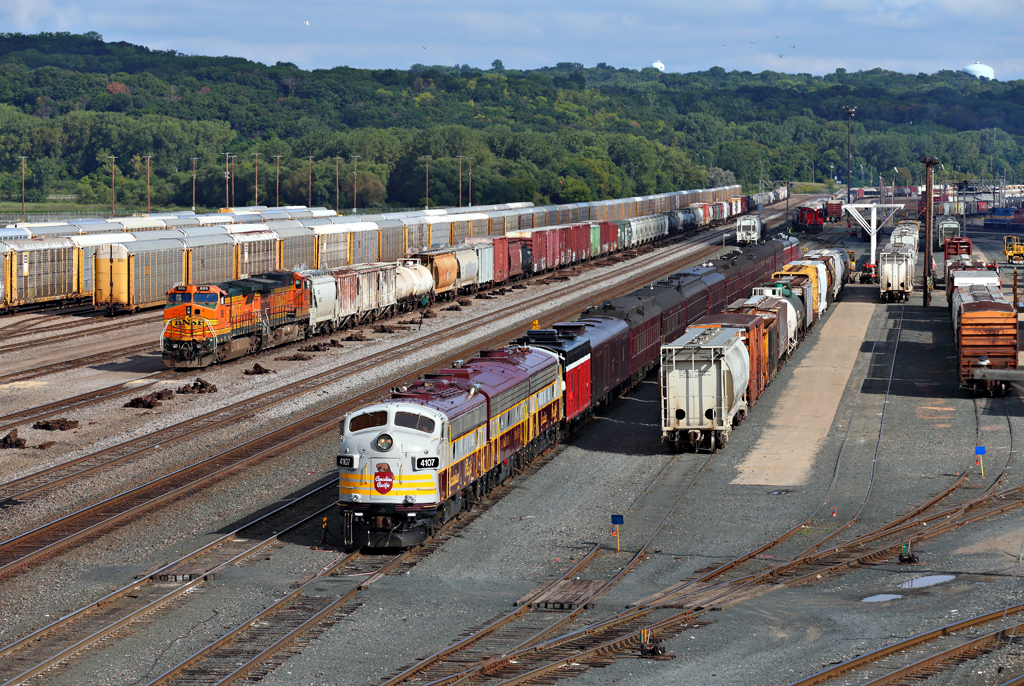Locally, the consent manufacturing machine was whirring on overdrive this past month as the threat of a national rail strike loomed.
A rail strike would cost the U.S. economy about $2 billion—per day. You could frame that as tremendous leverage for 115,000 blue-collar railway workers. Or you could frame it as a dire threat to our very way of life.
Warning of “catastrophic [economic] consequences,” KARE 11 spoke with two executives from the ethanol and corn industries. After blaming rail workers for not reaching a contract deal, Fox 9 platformed a U of M transportation researcher who lamented the lack of potential scabs at the ready. The Star Tribune amplified the hand-wringing voices of industry; MPR sounded the alarm for potentially inconvenienced rail commuters.
On Thursday afternoon, all those non-worker concerns became moot. At the urging of President Joe Biden, the U.S. Senate voted 80 to 15 to impose a previously rejected contract, effectively killing the ability of 12 unions representing railroad workers to strike. Another half-hearted piece of legislation that would've provided seven paid sick days—the current contract provides none—died when a 52-43 vote failed to overcome a filibuster, as expected. (Consult this primer to know where the labor impasse stands now.)
“It’s a pretty sad day for us. We’re very disappointed,” says Michael Sorman, a railway truck driver who’s represented by the Brotherhood of Maintenance of Way Employees. “It’s hard to know who to be mad at… it seems like everybody has failed us–our national division within our union failed us, the president has failed us, Congress has failed us, the railroad itself has failed us. I don’t think anybody was on our side.”
Adds labor historian Peter Rachleff, a former Macalester College professor and co-founder of the East Side Freedom Library:
“We go back to the Railroad Labor Act of 1926, and it makes me say, kind of sarcastically, that workers have the right to strike in the United States… unless the strike can actually have an impact. And if it’s going to have an impact, the right gets taken away. That has always been the case with rail.”
Sorman, whose six-member team repairs tracks from Minneapolis to Big Lake, laughs wearily while noting four senators didn't even show up to deny sick days from rail workers. (Senators, by the way, are afforded unlimited sick days.)
Why do the CEOs of railroad companies fear sick leave, a freedom that almost 80% of U.S. laborers enjoy? Those “latter-day robber barons” think it’d gum up their system of P.S.R.—precision-scheduled railroading—New York Magazine writes in this helpful explainer. Rail bosses dream of one day shifting to one-man conductor crews, Rachleff says, which would present obvious and calamitous drawbacks should, ya know, something happen to the lone conductor.
“It’s just kind of a way to pay employees less money while making sure they’re working every moment they’re there,” Sorman says of P.S.R. “They’re using labor as a commodity and trying to maximize that.”
Their Amazon-evoking efficiency obsession is in the service of even greater profits, even if P.S.R. punishes workers who aren’t constantly on-call; the seven major North American railroad companies hauled in a combined $27 billion in net profits last year, riches they showered to investors via hundreds of millions in stock buybacks and dividends. “I gotta say that they are maybe the worst case of corporate greed that I have seen,” Sen. Bernie Sanders said Thursday.
Audibly exhausted, Sorman says his short-staffed team worked a 10-hour day Thursday while trying to keep tabs on the Senate votes: “I’ve seen my youngest for about 10 minutes this week." Yesterday was their shortest day this week, he says, a consequence of American freight companies shedding almost 30% of their workers over the past six years, NY Magazine reports. Sorman doesn’t feel the media or the politicians articulated the stakes around the contract. Flashy figures like 24% pay raises and $5,000 bonuses don’t take into account stagnating pay over the past five years, he says, in addition to inflation.
Rachleff isn’t surprised by the lack of headlines advocating for workers who fortify the backbone of the freight industry.
“The media has largely taken the ‘our economy is fragile, we need to be careful not to take it into a crisis’ stance,” he says. “The media never says they’re primarily for the oligarchs who run the railroads. Rather, their concern is this creature called ‘the economy.’ Unfortunately, the economy typically runs at the expense of workers, whether that’s exploitation or underpayment.”






